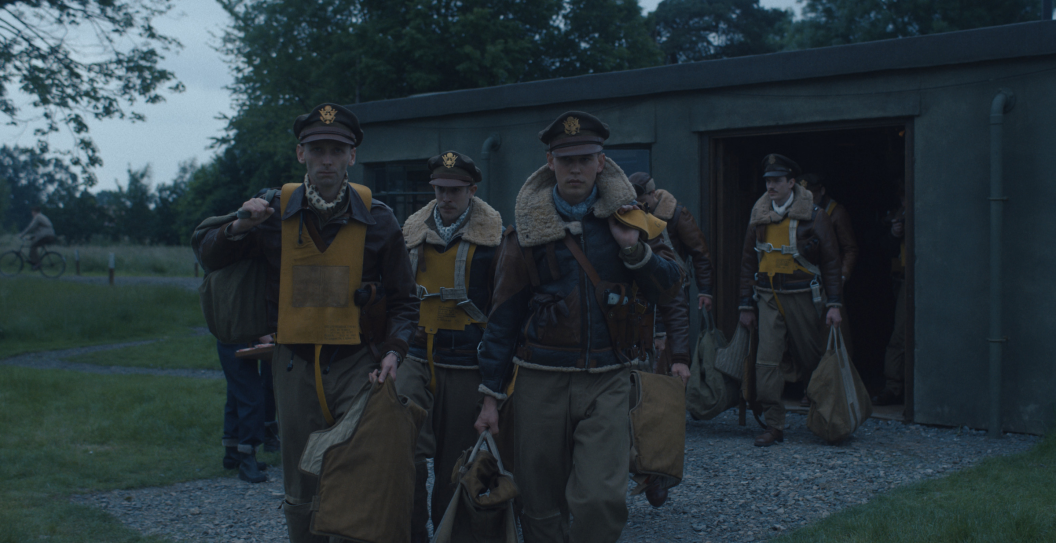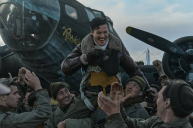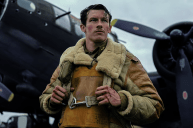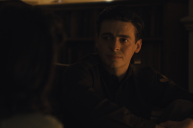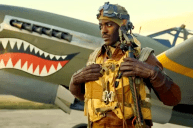Warning: this article contains spoilers for "Masters of the Air" Chapter Four
Videos by Wide Open Country
The first three episodes of "Masters of the Air" were dominated by epic aerial battles. There were none in Chapter Four, but that's not to say the episode was devoid of thrills. Instead, we experience the perilous journey back to England made by the men whose planes were shot down. And we see firsthand the devastating effects of bombing missions from the ground looking up.
We learn that Sgt. William Quinn (Kai Alexander) rebuked his chance to surrender to the Nazis, and is instead working with the French Resistance to escape to England. He is no doubt fueled by the trauma from Chapter Three, where he tragically had to leave a trapped Baby Face behind when he bailed out of their burning Fortress.
He is led to a nearly empty French café by a young woman in the Resistance, where he's reunited with Sgt. Charles K. Bailey (Bailey Brook). Bailey is sitting with a fellow airman named Bob. The men are interrogated by a Resistance leader, answering questions about everything from their mission to Babe Ruth. The interrogation culminates in each of them singing the Star Spangled Banner, which Quinn only partially remembers.
The three airmen are led into the woods after the interrogation to begin their escape, relieved to be done with nerve-racking questions. Suddenly, a Resistance leader shoots Bob dead. He reveals to a stunned Quinn and Bailey that the man is an undercover infiltrator attempting to expose their Resistance network.
"But what if you made a mistake?" Quinn gasps, unconvinced, and probably more than a little fearful for his own life after flubbing the National Anthem.
"We don't make mistakes."
Silent Heroes
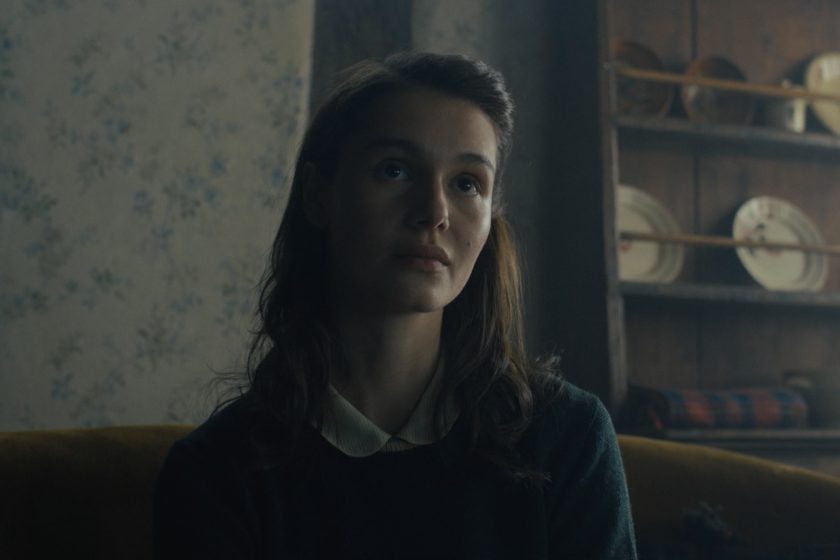
Apple TV+
By 1943, an Allied airman knew that if he were shot down, he had about a 50% chance of escaping Nazi territory. And if he wanted any shot at evading capture, he needed to rely on the 12,000 or so French civilians working along covert escape routes. In the book Silent Heroes: Downed Airmen and the French Underground, author Sherri Greene Ottis says that over 5,000 airmen found freedom along these routes, which were strikingly similar to the Underground Railroad in the US. The French used secret codes and a network of safehouses to grant the airmen safe passage. They offered up their meager food and their own homes, all while knowing that if they were caught, they and their families would be tortured before being sent to a concentration camp or killed.
We see just how much the French people are risking in Part Four. Quinn has struck up a romance with Louise, one of the young women who found him, but he must kiss her goodbye and join Bailey on the hidden road to freedom. As they are led along the trail, it's heartbreaking to hear Bailey speak optimistically about Baby Face — "I'm sure Baby Face found a way out" — when we know he didn't. Quinn knows, too, and is still searching for the courage to break the terrible news.
At the next safe house, the airmen are handed off to their next guide, Mijou. Bailey comments that Mijou looks like she's barely a teenager (young women weren't seen as a serious threat by the Nazis and so it was easier for them to duck the Gestapo). The airmen are skeptical about entrusting their lives to such a young woman, but she quickly proves she's far more equipped for the journey than they are. She keenly notices a scarf around Quinn's neck, given to him by Louise, and tells her father to search Quinn's bag. Her hunch was spot on: Dad finds a love letter written to Quinn by Louise. Dad burns it, scolding Quinn — if he were to be caught and the letter found, Louise's entire family would be shot. Quinn apologizes for being so stupid. Mijou says something in French, which her father translates: "Here... stupid means dead."
Later, on a train, Quinn tells Bailey about how Baby Face died. Then he makes another blunder. A French official is asking for Quinn's ticket and ID when Quinn spots a Nazi flag as they pull into the station. He panics and makes a run for it. He's halfway through the next train car when another guide stops him, a young woman named Manu. She tells him to quit making a scene and walk calmly back to the cabin. Mijou covers for him by saying he's deaf and the official had startled him, which somehow works. And Manu gets the official off their case by saying she saw a thief further down the train. Crisis averted. But they aren't out of the woods yet. Far from it, Manu warns them.
I'm loving this dynamic of the women keeping their cool as the warrior men drop the ball left and right. The fact that their heroics are true makes these scenes all the more impactful.
From the Ground Up
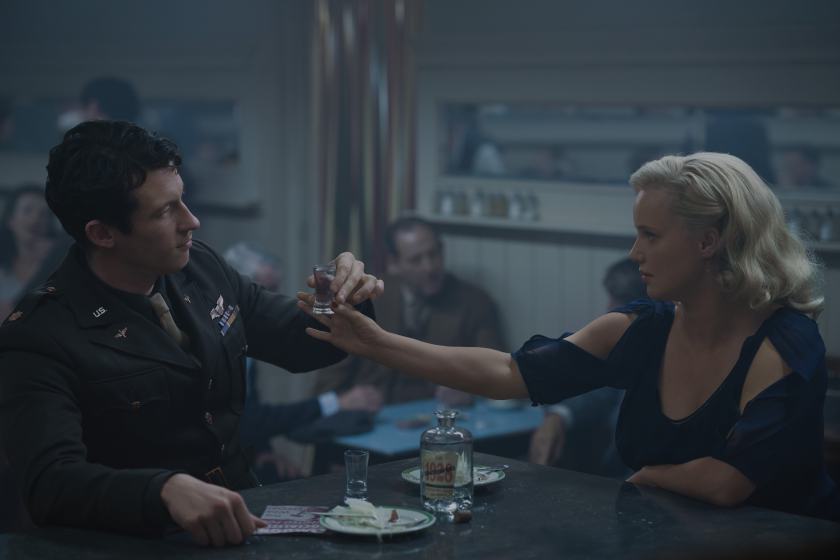
AppleTV+
"Masters of the Air" is based on the book of the same name by Donald L. Miller. And a major component of the book is its vivid descriptions of the sheer hell bombing missions wrought at the ground level. Miller describes the raging inferno the people of Hamburg suffered as the Royal Air Force and the US Eighth Air Force, which includes our guys in the Hundredth, rained thousands of tons of high-explosive and incendiary bombs on top of them. He describes the wall of flames and the terror and despair felt by the German people, who had finally realized the Nazi regime could be toppled.
For the first time, the series hints at a reckoning with the ghastly civilian toll of the bombing missions. Up until this point, we'd only seen the bombs burst from a plane's eye view. But as Bucky (Callum Turner) visits London for a weekend of respite, he sees the "business end" of a raid. After shacking up with a woman from Poland whose husband had been killed in the war, he watches explosions light up the dark London skyline.
Bucky expresses remorse for the civilians he knows he's killed. But the Polish woman has no sympathy for the Germans, saying they must be "as merciless as they have been to her people." (Indeed, the Germans were merciless toward the Poles — by the end of the war, around 6 million of them had been killed under German occupation).
But Bucky isn't reassured by her eye for an eye justification. "If there were balance in all this," he says, "my ticket would have been punched a long time ago." It's tough to see Bucky, who's always been the voice of optimism around Buck (Austin Butler), tacitly admit that in a just and "balanced" world, he would have been killed for what he's done.
The next day, he's walking through London when he sees a house reduced to rubble. A woman is screaming as rescuers pull the limp body of a small child from the wreckage. Bucky's face says it all: he sees his own handiwork in those ruins. But his remorse is fleeting. When he reads a newspaper headline that mentions 30 bombers being downed in the most recent mission, he rushes to a phone booth and calls the base. Speaking in code, the other end informs him that Buck "went down swinging."
Any sympathy the series may have evoked for the German civilians is washed away in a swell of inspiring string music. His best bud is down — and Bucky's cutting his vacation short.
"Tell coach I'll be there by game time," he says, still speaking in code. "And Red... I wanna pitch."
Watch new episodes of "Masters of the Air" Fridays on Apple TV+.
